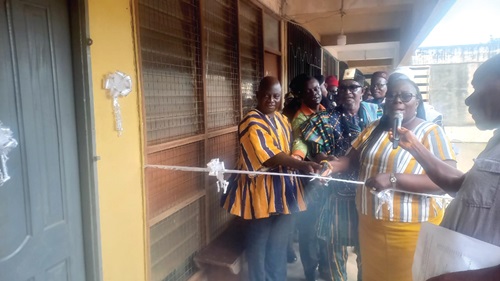
Stool Lands inaugurates 10th regional office in Bolgatanga
The 10th regional Office of the Administrator of Stool Lands (OASL) has officially been opened in Bolgatanga in the Upper East Region to oversee land administration and other related issues.
Although the office started operations in the region in 2008, it was upgraded in 2012 to a full district office.
It has now been elevated to a regional office with a staff strength of 12.
Speaking at the inauguration of the office, the Administrator of Stool Lands, Maame Ama Edumadze Acquah, said in 2019, President Nana Addo Dankwa Akufo-Addo challenged most institutions, including OASL, to establish new regional offices to bring their services to the doorsteps of the people.
She noted that the elevation of the regional office, with district offices in Bolgatanga, Bawku, Paga, Sandema and Fumbisi, would help deepen OASL’s operations in the region, to reach out to diverse stakeholders and clients.
She stated that over the years, the OASL had lived up to its mandate by mobilising skin land revenues from the area and disbursing the same to its beneficiaries for their intended purposes.
Crucial role
Mrs Acquah noted that the crucial role of proper land administration could be over-emphasised, as it was the reason the government was determined to ensure that the land administration system, especially land registration and rental payments was streamlined to make it attractive to prospective investors and lessees.
She mentioned that the OASL was currently collaborating with GIZ to digitalise its operations throughout the country, stressing that “this entails spatial identification of property owners or lessees to facilitate the payment of rent.
“This is aimed at addressing the fundamental challenges in revenue mobilisation to help achieve the ‘Ghana Beyond Aid Agenda’, adding “the Upper East office had received its share of development from the skin land revenues over the years.”
Haphazard development
Mrs Acquah mentioned that the results of non-adherence to the laid down rules and regulations on customary land management in the region were evidenced in the haphazard nature of settlements.
He said the lack of collaboration, cooperation and greediness, among others, had empowered infiltrators into the allocation of parcels of land to develop without recourse to planning, demarcation, documentation and registration rules.
“These challenges can only be dealt with if traditional authorities could resolve their petty differences, stop litigations and close their ranks to work closely with the statutory land institutions and the Regional Coordinating Council (RCC),” she pointed out.
Land administration
The Upper East Regional Minister, Stephen Yakubu, said the establishment of the new office would promote and enhance better customary land administration and improve revenue mobilisation, for not only traditional authorities but district assemblies as well, for local development.
He told the office that they were mandated by law to ensure that stool and customary lands were effectively and efficiently managed, which required it to “collaborate with relevant stakeholders in all matters relating to lands for the benefit of all.”
Further, he called for the creation of land banks for the future execution of development projects by the government, as well as the protection of state lands from encroachment by private individuals.
The Paramount Chief of the Bongo Traditional Area, Naba Baba Salifu Atamale Lemyaarum, who chaired the ceremony, advised chiefs and Tindanas to always work together to end unnecessary tussles between them over land.
Writer’s email;
